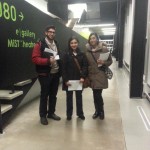 This term has been even more hectic than usual, with a perfect storm of teaching, research and administrative (bureaucratic) duties. As a result, I got behind with my regular twice monthly blog posts. I'm now attempting to get back on track with a double post.
This term has been even more hectic than usual, with a perfect storm of teaching, research and administrative (bureaucratic) duties. As a result, I got behind with my regular twice monthly blog posts. I'm now attempting to get back on track with a double post.
In addition to teaching Plant Ecology, I've also been supervising three undergraduate students who are doing their Biology honours thesis (BIOL 4000) with me (Aqeel, Jana and Harsimrat, upper left, at Ontario Biology Day, University of Toronto, Mississauga, March 2014), and two students doing their undergraduate Research Practicum in the lab (Jeevika and Natan, see at lower right, flanking Netta at the International Society for Biocuration conference at Hart House, University of Toronto, April 2014).
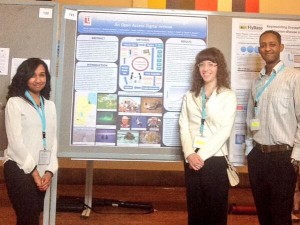 One of the things that's difficult, yet essential for students to learn about science, is its collaborative, team nature. Yes, a lot of research happens when a person is alone: thinking, planning, measuring stuff, entering and analyzing data, and writing. But, those activities are informed by conversations, feedback and peer-review. One of the main places where these kinds of important interactions happen, is the scientific conference.
One of the things that's difficult, yet essential for students to learn about science, is its collaborative, team nature. Yes, a lot of research happens when a person is alone: thinking, planning, measuring stuff, entering and analyzing data, and writing. But, those activities are informed by conversations, feedback and peer-review. One of the main places where these kinds of important interactions happen, is the scientific conference.
An important part of teaching and mentoring students about science research, is giving them an opportunity to both learn HOW to attend conferences and to attend them.
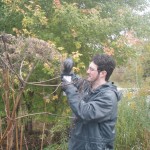 David Staples, a past and returning grad. student in my lab. (at left), took on the role of presenter at the weekly lab. meeting, and of guest blogger, to explain why attending conferences is a good thing. Here are his thoughts on the topic. Many thanks, David!
David Staples, a past and returning grad. student in my lab. (at left), took on the role of presenter at the weekly lab. meeting, and of guest blogger, to explain why attending conferences is a good thing. Here are his thoughts on the topic. Many thanks, David!
Why go to a scientific conference? by David Staples
Generally speaking, there are numerous reasons to attend a conference. There are undoubtedly other reasons than the ones listed below but these are the 5 primary reasons most people pursue showcasing their work at scientific conferences.
1. Networking
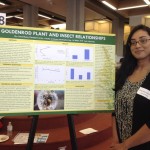 Whether it is to meet potential collaborators, shop around for a lab to join, or to rub shoulders with other people who do similar work to yours, networking is a key part of any conference-going experience. This is what will occupy almost all of the time when you are not listening attentively in a lecture session and some of your time when you are.
Whether it is to meet potential collaborators, shop around for a lab to join, or to rub shoulders with other people who do similar work to yours, networking is a key part of any conference-going experience. This is what will occupy almost all of the time when you are not listening attentively in a lecture session and some of your time when you are.
2. Learning about new research
 Conferences provide a receptive audience to whom researchers can present new ideas, new equations, new applications, or synthesize previously published results. Frequently, talks and posters present research that has yet to be submitted to a journal or is still in the peer review stage. Sometimes research will have just been accepted for publication but the actual article won’t be available for months. Conferences provide an excellent opportunity for students and researchers to expand their own understanding of a subject without having to deal with the lag period separating the completion of an analysis and the dissemination of those findings.
Conferences provide a receptive audience to whom researchers can present new ideas, new equations, new applications, or synthesize previously published results. Frequently, talks and posters present research that has yet to be submitted to a journal or is still in the peer review stage. Sometimes research will have just been accepted for publication but the actual article won’t be available for months. Conferences provide an excellent opportunity for students and researchers to expand their own understanding of a subject without having to deal with the lag period separating the completion of an analysis and the dissemination of those findings.
3. Presenting your own research
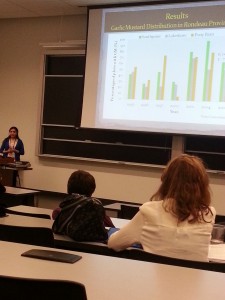 Conferences are THE place to present your work to the scientific community at large and are a great place to get your name and face associated with the content you are producing. Conferences also provide an excellent opportunity to discuss your research with other people who are able to fully comprehend your work and where it fits into the current mosaic of scientific knowledge. This can be a great resource for brainstorming about ways of tackling any problems you may have encountered, adding additional information to your existing dataset, or a different application than you had first thought of for your findings. They provide an excellent resource for fully realizing the potential of your project and also for giving yourself ideas of where to take things next.
Conferences are THE place to present your work to the scientific community at large and are a great place to get your name and face associated with the content you are producing. Conferences also provide an excellent opportunity to discuss your research with other people who are able to fully comprehend your work and where it fits into the current mosaic of scientific knowledge. This can be a great resource for brainstorming about ways of tackling any problems you may have encountered, adding additional information to your existing dataset, or a different application than you had first thought of for your findings. They provide an excellent resource for fully realizing the potential of your project and also for giving yourself ideas of where to take things next.
4. Boosting your CV
 Part of being a scientist is learning how to sell yourself as well as your research. Attending a conference and giving a talk or poster presentation give you a definite event to add to your CV and also gives you something extra to talk about if and when you interview for a position.
Part of being a scientist is learning how to sell yourself as well as your research. Attending a conference and giving a talk or poster presentation give you a definite event to add to your CV and also gives you something extra to talk about if and when you interview for a position.
5. Seeing new places
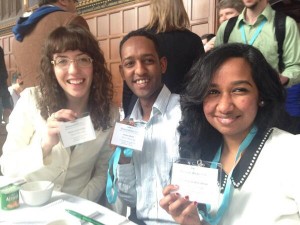 Conferences provide an opportunity to visit and explore parts of the world you would otherwise be unlikely to visit on your own. While a lot of what goes on at a conference takes place in university halls or convention centres, there are generally ample opportunities for exploring the local area and experiencing the place where you are staying. Whether you are simply encountering a new campus in your area, exploring a town/city in your region, or experiencing the culture of a place half the world from home, a conference provides a unique opportunity for acquainting yourself with new and interesting places. (Netta, a previous Research Practicum student in the lab., with Natan and Jeevika at Hart House, University of Toronto).
Conferences provide an opportunity to visit and explore parts of the world you would otherwise be unlikely to visit on your own. While a lot of what goes on at a conference takes place in university halls or convention centres, there are generally ample opportunities for exploring the local area and experiencing the place where you are staying. Whether you are simply encountering a new campus in your area, exploring a town/city in your region, or experiencing the culture of a place half the world from home, a conference provides a unique opportunity for acquainting yourself with new and interesting places. (Netta, a previous Research Practicum student in the lab., with Natan and Jeevika at Hart House, University of Toronto).

